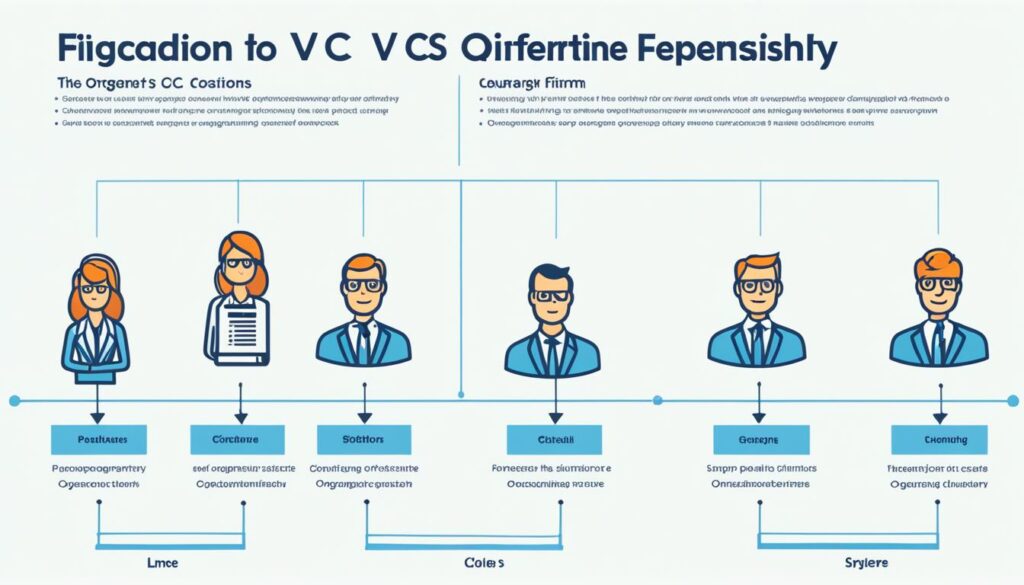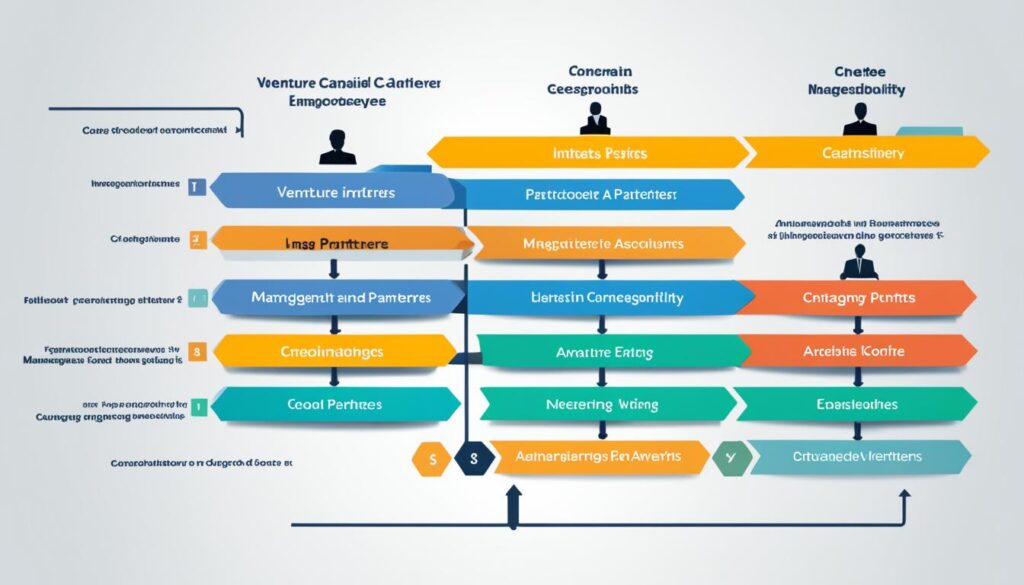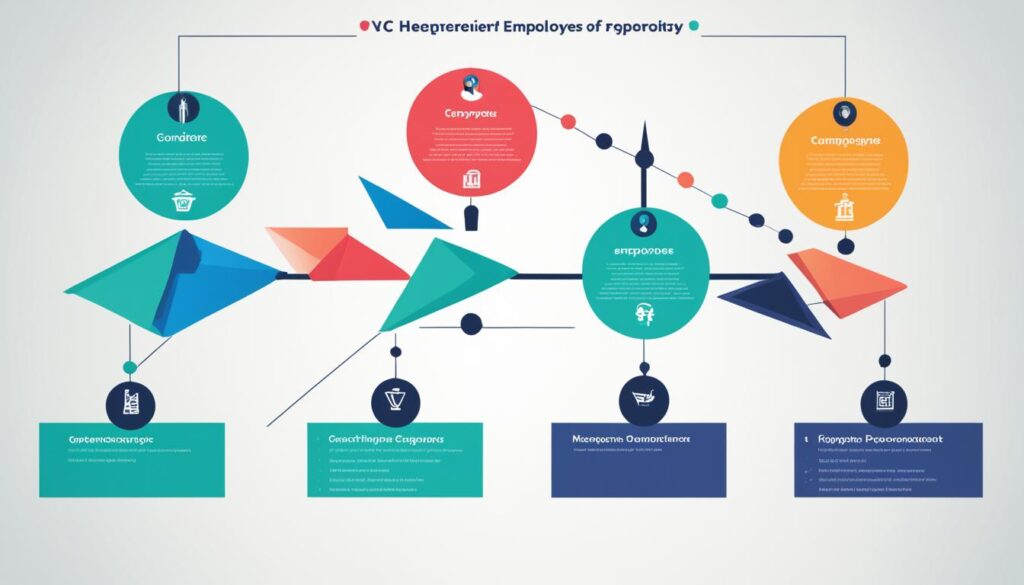The venture capital (VC) industry operates with a well-defined hierarchical structure, where each level of employees plays a crucial role in the investment process. Understanding the hierarchical makeup of a VC firm can provide valuable insights into the responsibilities, decision-making power, and career progression opportunities within this dynamic field.
At the top of the VC hierarchy are the Partners, the seasoned professionals who hold the ultimate decision-making authority. They are responsible for analyzing investment opportunities, managing the firm’s portfolio, and raising capital from limited partners. These individuals are also typically involved in business development, as well as recruiting and training new members of the team.
Key Takeaways
- Venture capital firms have a clear hierarchical structure with distinct roles and responsibilities for each level of employees.
- Partners, the most senior members, are responsible for investment decisions, portfolio management, and fundraising.
- The career progression within a VC firm typically involves moving from entry-level analyst to associate, investment manager, and ultimately, partner.
- Networking and personal development are essential for career advancement in the VC industry.
- Emerging roles, such as Entrepreneurs-in-Residence, reflect the industry’s evolution in supporting startups and portfolio companies.
Understanding the Venture Capital Firm Structure
Venture capital firms have a distinct structure and hierarchy that governs the roles and responsibilities of their employees. This hierarchical arrangement ensures efficient decision-making, effective investment management, and the successful execution of the firm’s overall venture capital firm structure.
Roles and Responsibilities
At each level of the vc firm hierarchy, employees are assigned specific venture capital firm roles and responsibilities that contribute to the firm’s success. These responsibilities range from deal sourcing and due diligence to portfolio management and fundraising, with each team member playing a vital role in the investment process.
Hierarchical Levels
The hierarchy within a venture capital firm typically consists of several levels, including analysts, associates, principals/venture partners, and general partners/managing directors. Each level carries increasing levels of seniority, decision-making authority, and strategic oversight, creating a clear vc firm hierarchy that allows the firm to operate efficiently and effectively.

| Level | Roles and Responsibilities |
|---|---|
| Analysts | Entry-level positions focused on research, data analysis, and supporting the investment team |
| Associates | More experienced team members responsible for deal evaluation, due diligence, and portfolio management |
| Principals/Venture Partners | Senior investment team members involved in deal sourcing, negotiation, and portfolio company oversight |
| General Partners/Managing Directors | Top-level decision-makers responsible for the firm’s overall investment strategy, fundraising, and management |
The Role of Analysts
Within the venture capital (VC) firm hierarchy, analysts play a crucial role in supporting the investment process. As the most junior members of the investment team, VC analysts typically hold an entry-level position and are responsible for a variety of tasks that provide essential research and analytical support.
Entry-Level Position
Analysts are often recent graduates or individuals with 1-2 years of relevant experience, such as in investment banking, consulting, or private equity. They are brought on to the VC team to learn the ropes and gain exposure to the vc analyst responsibilities that are essential for advancing their vc analyst career path.
Research and Support
The primary responsibilities of a VC analyst include conducting in-depth market research, financial modeling, and due diligence on potential investment opportunities. Analysts gather and analyze data, prepare investment memos, and provide support to the more senior members of the investment team during the evaluation and decision-making process.
Networking and Industry Trends
In addition to their research and analytical duties, VC analysts are also expected to build relationships within the startup ecosystem and stay abreast of industry trends. This involves attending industry events, networking with entrepreneurs, and keeping a pulse on emerging technologies and market developments that could inform the firm’s investment strategy.
The Role of Associates
After gaining 1-3 years of experience as a venture capital analyst, professionals may be promoted to the role of associate within a venture capital firm. VC associates have more responsibilities and a greater involvement in the investment process compared to their analyst counterparts.
Due Diligence
One of the primary responsibilities of a VC associate is to conduct thorough due diligence on potential investment opportunities. This involves analyzing the target company’s financials, market position, management team, and growth potential. Associates work closely with the firm’s senior investment team to gather and synthesize critical information, ultimately helping to inform the final investment decision.
Deal Evaluation
VC associates play a crucial role in evaluating potential deals and investment opportunities. They assist in creating financial models, conducting market research, and assessing the competitive landscape to determine the viability and risk profile of each opportunity. The associate’s analysis and recommendations help the investment team make well-informed decisions.
Portfolio Management
Once an investment is made, VC associates are responsible for actively managing the firm’s portfolio companies. This includes monitoring the companies’ performance, participating in board meetings, and providing strategic advice and support to the portfolio company’s management team. Associates work to ensure the firm’s investments are meeting their growth and financial objectives.

The Role of Principals/Venture Partners
At the heart of a venture capital firm’s investment team are the principals and venture partners. These senior members play a critical role in shaping the firm’s investment decisions and overseeing its portfolio companies. Their extensive experience and deep industry knowledge make them invaluable assets to the VC organization.
Senior Investment Team Members
Principals and venture partners are considered senior investment team members, responsible for driving the firm’s investment strategy and execution. They leverage their expertise to identify promising venture opportunities, conduct thorough due diligence, and negotiate favorable deal terms for the firm. Their seasoned judgment and strategic insight are essential in evaluating potential investments and ensuring the long-term success of the VC firm’s portfolio.
Deal Sourcing and Negotiation
As seasoned venture capital principals and vc venture partners, these senior professionals are adept at sourcing and negotiating deals that align with the firm’s investment thesis. They maintain a robust network of industry connections, allowing them to identify high-potential startups and leverage their credibility to secure favorable terms for their firm. Their deal-making prowess is a crucial component of the VC principal’s career path and the firm’s overall success.
Portfolio Company Oversight
In addition to their deal-sourcing and negotiation responsibilities, vc principals and venture partners also play a pivotal role in the ongoing management and oversight of the firm’s portfolio companies. They may serve on the boards of these companies, providing strategic guidance, mentorship, and operational support to help them navigate the challenges of high-growth environments. This hands-on approach to portfolio company management is a hallmark of the VC principal’s responsibilities and a key driver of value creation for the firm.

General Partners/Managing Directors
At the pinnacle of the venture capital firm hierarchy are the general partners (GPs) and managing directors. These seasoned professionals are responsible for the firm’s overall investment strategy, management, and decision-making processes. As venture capital general partners and vc managing directors, they play a crucial role in shaping the direction and success of the firm.
Investment Decision-Makers
GPs and managing directors are the primary investment decision-makers within the venture capital firm. They leverage their extensive industry experience, deep market insights, and robust networks to identify promising investment opportunities, evaluate potential deals, and make strategic investment decisions on behalf of the firm and its limited partners.
Fund Raising
The vc partner career path often involves significant responsibility for fundraising, as GPs and managing directors are tasked with raising capital from institutional investors, high-net-worth individuals, and other limited partners. Their ability to effectively communicate the firm’s investment thesis, track record, and value proposition is crucial in securing the necessary funding to fuel the firm’s investment activities.
Firm Management
In addition to their investment duties, general partners and managing directors are responsible for the overall management and strategic direction of the venture capital firm. This includes overseeing the firm’s operations, managing the investment team, setting and implementing policies, and ensuring the firm maintains a competitive edge in the rapidly evolving venture capital landscape.

Limited Partners: The Investors
Limited partners (LPs) are the investors who provide the capital that venture capital firms use to fund their investments. LPs in venture capital funds can be institutional investors such as pension funds, college endowments, trusts, insurance companies, health care systems, family offices, and sovereign wealth funds. LPs often include venture capital firms themselves, as they seek to diversify their own portfolios.
LPs have limited liability in the partnership, and their responsibility for debts or legal liabilities is typically limited to their investment stakes in the partnership. This limited liability structure is a key feature that attracts many vc fund investors to participate in venture capital funds.
Delaware is a popular state for forming venture capital funds and firms due to specific court decisions that have clarified business transactions. Limited liability companies (LLCs) are also a common structure for venture capital firms, offering pass-through taxation and limited liability protection for members.
| Limited Partner (LP) Characteristics | Details |
|---|---|
| Liability | LPs have limited liability, with responsibility typically limited to their investment stakes. |
| Common LP Types | Institutional investors, such as pension funds, endowments, insurance companies, and sovereign wealth funds. |
| Legal Structures | Delaware and limited liability companies (LLCs) are common for venture capital funds and firms. |
| Partnership Agreements | Limited partnership agreements (LPAs) detail the terms governing the partnership, including ownership percentages. |
The limited partnership agreement (LPA) is the contract that outlines the terms of the partnership, including the percentage of ownership for each general partner (GP) and limited partner (LP) based on their capital contributions. Amendments to LPAs can alter the governance and terms of the partnership, while an amended and restated LPA replaces the existing agreement entirely.
Overall, venture capital fund investors play a crucial role in providing the necessary capital for venture capital firms to identify, invest in, and support promising startups and emerging technologies.

What is the hierarchy of VC employees?
The hierarchy of employees within a venture capital firm generally follows a clear progression path. This career journey enables professionals to develop the necessary skills and experience to advance through the venture capital employee hierarchy.
Analyst to Associate Progression
The transition from analyst to associate typically takes around a year for those demonstrating a strong eagerness to learn and navigate the VC world. Analysts, who hold entry-level positions, gradually take on more responsibilities and become more involved in the investment process as they progress to the associate level.
Associate to Investment Manager
The move from associate to investment manager generally occurs within a year’s time. Associates gain valuable experience in due diligence, deal evaluation, and portfolio management, positioning them for the investment manager role, where they have greater influence over the firm’s investment decisions.
Investment Manager to Partner
The path from investment manager to partner typically spans one to five years as an associate. Professionals who excel in their investing roles, demonstrating skills in deal sourcing, due diligence, and portfolio oversight, often ascend to the principal or partner level, where they play a significant role in shaping the firm’s investment strategy and managing its growing portfolio.

The Role of Entrepreneurs in Residence
Some venture capital firms have introduced a unique role called the “Entrepreneur in Residence” (EIR) to leverage the expertise of experienced entrepreneurs and support their portfolio companies. The EIR serves as a bridge between the venture capital firm and its investments, providing valuable mentorship and guidance to founders and their teams.
Experienced Entrepreneurs
Venture capital entrepreneurs in residence are typically seasoned entrepreneurs who have successfully built and scaled their own businesses. These individuals bring a wealth of practical knowledge and industry insights that can be invaluable to the venture capital firm and its portfolio companies. By tapping into the vc eir responsibilities, the firm can offer a deeper level of support and guidance to founders navigating the challenges of growth and scale.
Portfolio Company Mentorship
One of the primary vc eir role is to provide hands-on mentorship and support to the founders and teams within the venture capital firm’s portfolio. The venture capital entrepreneur in residence can share their own experiences, offer strategic advice, and help the portfolio companies navigate critical decisions and milestones. This personalized guidance can be particularly valuable for first-time founders or those facing complex operational or organizational challenges.
By leveraging the expertise and experience of seasoned venture capital entrepreneur in residence, venture capital firms can enhance the value they provide to their portfolio companies, ultimately driving stronger investment outcomes and reinforcing their position as trusted partners in the startup ecosystem.

Emerging Roles and Trends
As the venture capital industry continues to evolve, new roles and organizational structures are emerging to meet the changing needs of the startup ecosystem. Two key trends that are shaping the VC landscape are the rise of incubators and accelerators, as well as the increasing importance of co-working spaces.
Incubators and Accelerators
Incubators and accelerators have become essential for venture capital firms seeking to source high-quality investment opportunities. These programs provide startups with mentorship, resources, and funding, while also serving as a pipeline for VC firms to identify promising ventures. In response, VC firms are adapting by creating new roles and upskilling existing employees to manage and support these incubator and accelerator programs, demonstrating the venture capital emerging roles and vc industry trends that are reshaping the industry.
Co-working Spaces
The proliferation of co-working spaces has also influenced the vc firm organizational changes within the venture capital industry. These shared office environments provide a hub for startups, entrepreneurs, and investors to collaborate and network, making them an attractive resource for VC firms. As a result, some firms are establishing a presence in co-working spaces, either through direct investments or by embedding their own talent within these vibrant ecosystems to stay connected with the latest trends and emerging opportunities.

The Importance of Networking and Personal Development
Networking and personal development are critical components of success in the venture capital industry. Professionals at all levels of the VC hierarchy must continuously work to expand their industry connections and improve their skills to advance their VC career growth.
Building a robust network within the venture capital networking ecosystem is essential for identifying investment opportunities, sourcing deals, and staying informed about industry trends. VC professionals must actively engage with entrepreneurs, fellow investors, and industry influencers to stay on the pulse of the startup landscape.
In addition to networking, VC personal development is crucial for maintaining a competitive edge. Continuous learning, skill-building, and self-reflection are necessary for VC professionals to adapt to the constantly evolving demands of the industry. From mastering financial modeling to honing negotiation techniques, the most successful VC professionals are those who prioritize their professional development.
By prioritizing venture capital networking and VC personal development, VC professionals can position themselves for long-term career growth and advancement within the industry. Whether it’s leveraging industry connections to uncover new investment opportunities or developing specialized expertise to add value to portfolio companies, these skills are essential for thriving in the fast-paced and competitive world of venture capital.

Conclusion
The venture capital industry operates with a well-defined hierarchical structure, where each level of employees plays a crucial role in identifying, evaluating, and managing investments. From the entry-level venture capital analysts to the senior-most general partners, every member of the VC team contributes to the firm’s success.
As professionals navigate the venture capital career path, they can expect to progress through various stages, such as the analyst-to-associate transition, the associate-to-investment manager role, and the investment manager-to-partner progression. Each step along the way requires a unique set of skills and responsibilities, ensuring that the VC firm’s structure remains aligned with the industry’s evolving needs.
The overview of the VC firm structure and the roles and responsibilities of its employees provides valuable insights into the inner workings of this dynamic industry. By understanding the hierarchy and the pathways for career advancement, aspiring professionals can better navigate the venture capital landscape and position themselves for success.
